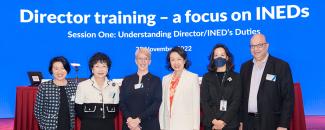CGj reviews the first part of a new series of training sessions launched by the Institute, in collaboration with Hong Kong Exchanges and Clearing Ltd (HKEX), to broaden awareness and understanding of directors’ duties, especially those of independent non-executive directors (INEDs).
As organisations of all types are facing major challenges, from digital transformation to cybersecurity and sustainability, the value of having an effective board has never been better recognised. As a result, directors are facing increased scrutiny, expectations and personal accountability in the fulfilment of their duties.
Against this backdrop, the Institute, in collaboration with HKEX, has launched a new series of training sessions under the title: Director training – a focus on INEDs.
‘The last decade has seen many changes to the Listing Rules and the Corporate Governance Code (the Code),’ said Ernest Lee FCG HKFCG(PE), Institute President and Technical Partner, Deloitte China, in his welcoming address at the first training session, held in November 2022. ‘Directors are now facing much greater regulatory scrutiny and heightened expectations from investors, regulators and others. Directors’ oversight of various governance matters from risk management to ESG concerns are certainly within the remit of directors’ duties. Directors, including INEDs, are also increasingly called into account and assume personal responsibilities. The best form of risk mitigation is acquiring appropriate training and knowledge of regulatory and enforcement concerns.’
The series comprises three training sessions held at HKEX Connect Hall, giving participants the option of online or in-person attendance. It features HKEX speakers and experienced directors, as well as market practitioners and governance professionals, to promote a better understanding of how directors can meet current and future regulatory expectations, andenhance their contribution to good corporate governance.
In this article, CGj highlights the key takeaways from the first session of the series.
Directors’ duties
Directors’ duties have been a key theme of rule changes and enforcement actions by regulators in Hong Kong. Ellie Pang FCG HKFCG(PE), Institute Chief Executive, a speaker at the first training session, focused her presentation on the regulatory regime in Hong Kong relevant to directors’ duties.
She emphasised at the outset that HKEX has been, and will continue to be, highly vigilant in taking enforcement action against directors in breach of their duties. She pointed out that many of the enforcement actions described on the HKEX website relate to cases against directors based on Main Board Listing Rule 3.08 (GEM Rule 5.01), which sets out the expectations and requirements relating to directors’ duties.
Another point emphasised by Ms Pang was that the Listing Rules and Code apply to all directors, including non-executive directors (NEDs) and INEDs. This issue was raised in the Q&A session at the end of the training. The Chair of the Q&A, Edith Shih FCG(CS, CGP) HKFCG(CS, CGP)(PE), Past International President and Institute Past President, and Executive Director and Company Secretary, CK Hutchison Holdings Ltd, pointed out that it is not only executive directors who are penalised in regulatory enforcement actions. ‘NEDs, INEDs and company secretaries all have a role and responsibility in managing the company, so everybody is included,’ she said.
She addressed the following question from the floor to the speakers and panellists. ‘Why should an INED be held responsible in the same manner as an executive director – after all, they don't work in the company?’
Katherine Ng, Head of Listing, HKEX, both a speaker and panellist at the first training session, challenged the assumption behind the question. Given the collective responsibility all directors bear for the board’s decisions, she urged NEDs and INEDs to ensure they have a clear understanding of what they are taking on when they sign up for their roles.
‘Ultimately, they are signing up for monitoring and providing a critical check and balance on the management of the company. They might not be in the office every day, but they have the important role of checking that everything is in order,’ she said.
She acknowledged that there are common misconceptions about the INED role – in particular the idea that they are not to blame if management keeps them in the dark about any misconduct. She pointed out that one of their functions is to ensure the organisation has effective internal controls to prevent misconduct going unchecked.
‘I can't stress enough the importance of the oversight role of INEDs. Their responsibility is not just to turn up at meetings and they cannot rely solely on the information supplied by management,’ she said.
Panellist Teresa Ko JP BBS FCG HKFCG, Senior Partner, Hong Kong and China Chairman, Freshfields Bruckhaus Deringer, and Co-Vice Chair, IFRS Foundation, added that the Listing Rules are specifically designed to give all directors the right of access to the information they need to ensure that they can participate in board proceedings in a meaningful and effective way.
‘NEDs, including INEDs,’ Ms Ko said, ‘have a right to ask the company to give them the information they need in order to do their job.’
This point was a key theme of the training. Ms Pang emphasised that, while directors are not expected to be experts on everything, they do need to understand the issues being discussed at board meetings. This issue has special relevance to governance professionals since a key part of their board support work relates to keeping the board adequately informed. Ms Pang made it clear that, to allow directors to discharge their duties, management should provide them with all relevant information and documentation.
Nevertheless, she also stressed that directors cannot rely solely on the information provided by management. ‘They should do their own due diligence – investigating and asking for more information or documentation from management if they find anything unclear, or missing from the material they've been given. They can also seek help from company secretaries, compliance advisers, general counsel and from external parties such as external professional advisers,’ Ms Pang said. She added that it is the responsibility of the company to pay for any independent professional advice needed.
Another issue highly relevant to governance professionals is the role that director training should play in keeping directors informed. ‘For new directors there should be induction training and for existing directors there should be continuous training that will enable them to contribute to the company they serve more effectively,’ Ms Pang said.
Board independence and refreshment
Recent revisions to Hong Kong’s Listing Rules and the Code, effective from 1 January 2022, emphasise the importance of having a mechanism to ensure that independent views are available to the board. The rule changes include a new requirement for companies whose INEDs are all ‘long serving’ (having served more than nine years) to appoint a new INED.
Also, companies are required to disclose the length of tenure of any long-serving INEDs, on a named basis, in the AGM papers issued to shareholders. Additional disclosures are required on the factors considered, the process and the board’s discussion on why any long-serving INEDs are still considered independent and should be re-elected.
‘The idea is that if someone has served on a board for over nine years as an INED, this could make him or her a little cozy with management and less able to provide independent views or to provide sufficient challenge to discussions or decisions of the board,’ Ms Pang said.
This was backed up by Ms Ng. ‘We're not saying that long-serving INEDs are no longer of value to the company, that is up to the company to decide, but we do see the importance of board refreshment – that new perspectives are brought to the company.’
Board diversity
The value of having a diverse board was another theme of the training. HKEX has made progress in this space, particularly with regard to gender diversity and the intention, Ms Ng pointed out, ‘is to put an end to all single-gender boards on our exchange’.
In terms of IPO applications, HKEX now requires every listing applicant to have at least one female director on the board. It is still working, however, on existing listed issuers.
‘This is not something that can be changed overnight,’ Ms Ng acknowledged in her presentation, ‘but at the start of this exercise I was personally very alarmed and shocked to find that there were 800 companies with single-gender boards out of the total of around 2,500 companies.’
HKEX has brought in new requirements for companies to set targets and timelines for diversity. Ms Ng emphasised that this is not only about gender – companies need to be thinking about the best composition for their board in terms of a wide range of different factors, including age, experience and skills.
She added that HKEX launched its diversity repository – Board Diversity & Inclusion in Focus – last year. ‘A lot of stakeholders asked us about the gender and age distribution on the boards of our listed issuers. So we put together a repository to provide factual information on directors’ backgrounds and diversity. The repository has been very well received by the market. It not only assists stakeholders to understand the current diversity profile of the Hong Kong market, but also helps companies compare themselves with their peers on a range of different factors.
Ms Ng added that HKEX will expand the repository. ‘This is just a starting point,’ she said. ‘We're thinking about adding subcommittee information and more information on INEDs in the future.’
ESG
One of the fastest-evolving aspects of directors’ duties relates to the importance of board oversight of ESG and sustainability matters. Speakers and panellists at the training emphasised that companies need to prepare for much tougher rules on ESG disclosure and performance since regulators have already made it clear that they intend to align Hong Kong’s ESG regulatory regime with international standards.
Those standards have been coalescing around the existing recommendations of the Task Force on Climate-related Financial Disclosures (TCFD), set up in 2017 by the Financial Stability Board, and the standards expected to be launched later this year by the International Sustainability Standards Board (ISSB). The ISSB was launched in 2021 by the IFRS Foundation to develop a global baseline of sustainability-related disclosures.
The transition to a new ESG regulatory regime is likely to raise the bar significantly for companies in Hong Kong. ‘2023 will be a big year for ESG,’ said Ms Ng. ‘This is not a matter of whether it will come – it is definitely coming and companies need to start thinking about how they are going to report on their Scope 3 greenhouse gas (GHG) emissions.’
The draft ISSB standards include a requirement for companies to report on their Scope 3 emissions. This includes indirect emissions that occur in the value chain of the company, both upstream and downstream. To be able to comply with the Scope 3 requirement, companies will need to capture data from their supply chains and there is concern that such data will be difficult to access. Ms Ng pointed out, however, that many companies are already reporting on their Scope 1 and Scope 2 emissions, ‘and some of those emissions will be someone else's Scope 3 emissions,’ she said.
She added that the ISSB standards also include an expectation that companies should be disclosing how they are addressing climate risks by means of scenario analysis. Scenario analysis is an increasingly widely used tool to analyse companies’ business model resilience in various hypothetical future scenarios.
Companies will also be expected to publish targets and metrics on decarbonisation. Hong Kong has committed to achieving carbon neutrality by 2050 and companies will need to put in place measures to ensure that they remain in compliance with requirements designed to ensure Hong Kong meets that deadline.
The training session addressed the level of preparedness among companies in Hong Kong for the new regulatory expectations discussed above. ‘There needs to be an improvement in terms of the quality of the disclosure, but there have been significant improvements in terms of disclosure of board oversight of ESG matters. I think this puts us on a good footing to get ourselves ready for the ISSB standards,’ Ms Ng said.
She emphasised that the awareness of ESG has risen substantially in Hong Kong in recent years, pointing out that all listed companies produce some sort of ESG report and many are already reporting on climate-related issues. She added a recommendation for participants in the training to take a look at the ESG Academy on the HKEX website as a great place to get guidance on all of the issues discussed above.
Look out for our review of the second session in this training series held on 17 February. The third and final session was held on 17 March. More information is available on the Institute's website: www.hkcgi.org.hk.



